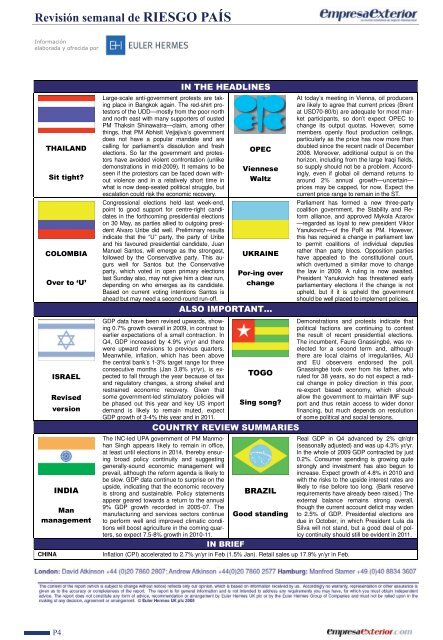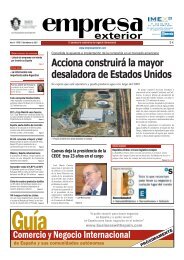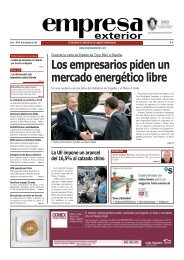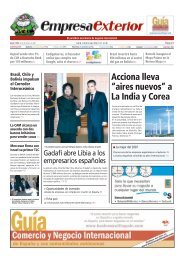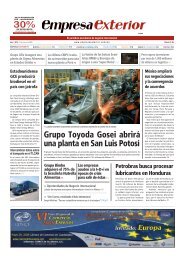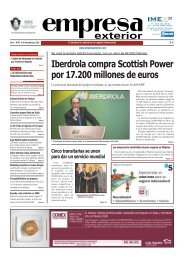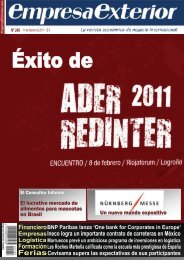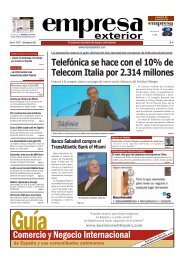Reino Unido - Empresa Exterior
Reino Unido - Empresa Exterior
Reino Unido - Empresa Exterior
Create successful ePaper yourself
Turn your PDF publications into a flip-book with our unique Google optimized e-Paper software.
Revisión semanal de RIESGO PAÍS<br />
Información<br />
elaborada y ofrecida por<br />
���������<br />
�����������<br />
���������<br />
������������<br />
�������<br />
���������<br />
��������<br />
������<br />
�<br />
�����<br />
�����������<br />
� �<br />
����<br />
�����������������<br />
Large-scale anti-government protests are taking<br />
place in Bangkok again. The red-shirt protestors<br />
of the UDD—mostly from the poor north<br />
and north east with many supporters of ousted<br />
PM Thaksin Shinawatra—claim, among other<br />
things, that PM Abhisit Vejjajiva’s government<br />
does not have a popular mandate and are<br />
calling for parliament’s dissolution and fresh<br />
elections. So far the government and protestors<br />
have avoided violent confrontation (unlike<br />
demonstrations in mid-2009). It remains to be<br />
seen if the protestors can be faced down without<br />
violence and in a relatively short time in<br />
what is now deep-seated political struggle, but<br />
escalation could risk the economic recovery.<br />
Congressional elections held last week-end,<br />
point to good support for centre-right candidates<br />
in the forthcoming presidential elections<br />
on 30 May, as parties allied to outgoing president<br />
Alvaro Uribe did well. Preliminary results<br />
indicate that the “U” party, the party of Uribe<br />
and his favoured presidential candidate, Juan<br />
Manuel Santos, will emerge as the strongest,<br />
followed by the Conservative party. This augurs<br />
well for Santos but the Conservative<br />
party, which voted in open primary elections<br />
last Sunday also, may not give him a clear run,<br />
depending on who emerges as its candidate.<br />
Based on current voting intentions Santos is<br />
ahead but may need a second-round run-off.<br />
GDP data have been revised upwards, showing<br />
0.7% growth overall in 2009, in contrast to<br />
earlier expectations of a small contraction. In<br />
Q4, GDP increased by 4.9% yr/yr and there<br />
were upward revisions to previous quarters.<br />
Meanwhile, inflation, which has been above<br />
the central bank’s 1-3% target range for three<br />
consecutive months (Jan 3.8% yr/yr), is expected<br />
to fall through the year because of tax<br />
and regulatory changes, a strong shekel and<br />
restrained economic recovery. Given that<br />
some government-led stimulatory policies will<br />
be phased out this year and key US import<br />
demand is likely to remain muted, expect<br />
GDP growth of 3-4% this year and in 2011.<br />
�����<br />
���������<br />
������<br />
��������<br />
�������������<br />
�������<br />
������������������<br />
�����<br />
�����������<br />
�������������������������<br />
The INC-led UPA government of PM Manmohan<br />
Singh appears likely to remain in office,<br />
at least until elections in 2014, thereby ensuring<br />
broad policy continuity and suggesting<br />
generally-sound economic management will<br />
prevail, although the reform agenda is likely to<br />
be slow. GDP data continue to surprise on the<br />
upside, indicating that the economic recovery<br />
is strong and sustainable. Policy statements<br />
appear geared towards a return to the annual<br />
9% GDP growth recorded in 2005-07. The<br />
manufacturing and services sectors continue<br />
to perform well and improved climatic conditions<br />
will boost agriculture in the coming quarters,<br />
so expect 7.5-8% growth in 2010-11.<br />
���������<br />
�������<br />
��������������<br />
CHINA Inflation (CPI) accelerated to 2.7% yr/yr in Feb (1.5% Jan). Retail sales up 17.9% yr/yr in Feb.<br />
At today’s meeting in Vienna, oil producers<br />
are likely to agree that current prices (Brent<br />
at USD70-80/b) are adequate for most market<br />
participants, so don’t expect OPEC to<br />
change its output quotas. However, some<br />
members openly flout production ceilings,<br />
particularly as the price has now more than<br />
doubled since the recent nadir of December<br />
2008. Moreover, additional output is on the<br />
horizon, including from the large Iraqi fields,<br />
so supply should not be a problem. Accordingly,<br />
even if global oil demand returns to<br />
around 2% annual growth—uncertain—<br />
prices may be capped, for now. Expect the<br />
current price range to remain in the ST.<br />
Parliament has formed a new three-party<br />
coalition government, the Stability and Reform<br />
alliance, and approved Mykola Azarov<br />
—regarded as loyal to new president Viktor<br />
Yanukovich—of the PoR as PM. However,<br />
this has required a change in parliament law<br />
to permit coalitions of individual deputies<br />
rather than party blocs. Opposition parties<br />
have appealed to the constitutional court,<br />
which overturned a similar move to change<br />
the law in 2009. A ruling is now awaited.<br />
President Yanukovich has threatened early<br />
parliamentary elections if the change is not<br />
upheld, but if it is upheld the government<br />
should be well placed to implement policies.<br />
Demonstrations and protests indicate that<br />
political factions are continuing to contest<br />
the result of recent presidential elections.<br />
The incumbent, Faure Gnassingbé, was reelected<br />
for a second term and, although<br />
there are local claims of irregularities, AU<br />
and EU observers endorsed the poll.<br />
Gnassingbé took over from his father, who<br />
ruled for 38 years, so do not expect a radical<br />
change in policy direction in this poor,<br />
re-export based economy, which should<br />
allow the government to maintain IMF support<br />
and thus retain access to wider donor<br />
financing, but much depends on resolution<br />
of some political and social tensions.<br />
Real GDP in Q4 advanced by 2% qtr/qtr<br />
(seasonally adjusted) and was up 4.3% yr/yr.<br />
In the whole of 2009 GDP contracted by just<br />
0.2%. Consumer spending is growing quite<br />
strongly and investment has also begun to<br />
increase. Expect growth of 4.8% in 2010 and<br />
with the risks to the upside interest rates are<br />
likely to rise before too long. (Bank reserve<br />
requirements have already been raised.) The<br />
external balance remains strong overall,<br />
though the current account deficit may widen<br />
to 2.5% of GDP. Presidential elections are<br />
due in October, in which President Lula da<br />
Silva will not stand, but a good deal of policy<br />
continuity should still be evident in 2011.


